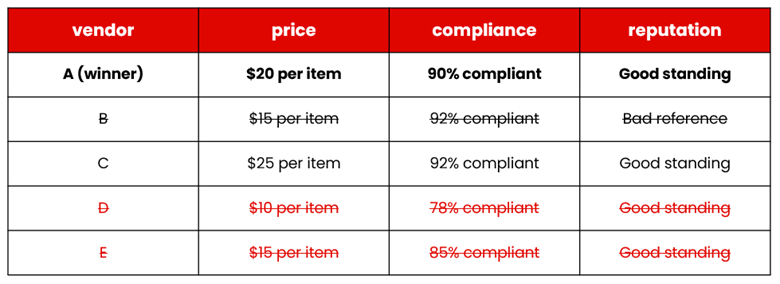
It is a misconception to believe the lowest-priced bid response will always win. While each government agency has a different evaluation process, there are pre-qualifications that must be considered before choosing the best bid response.
The goal of the RFP process is to level the playing field of suppliers to ensure against fraud and favoritism. It is our tax dollars that are being used to pay for these products/services and the winning vendor should be chosen by what serves the community best. There are laws in place to make sure our tax dollars are spent in the best ways possible, which prompts government agencies to gladly spend time and money on bid evaluation systems to pick the best choice.
While price does play a role, the cheapest response is not always what is best. A best-priced supplier could deliver sub-standard performance or products or fail to meet deadlines. This could lead to a pause in production and leave the government, and more importantly, their constituents (us), dissatisfied.
How They Level the Playing Field
Conducting Pre-Qualifications
A pre-qualification process may consider scores on reputation, capability, compliance, physical location, appropriate experience, quality control, and past performances. Some agencies consider bad reviews and community standards. Once these pre-qualifications are met, then pricing is considered. This would allow a proposal that is higher priced to be awarded over one that is less costly.
Example:
In the table below, vendors D and E were instantly disqualified because they were below 90% compliant. Of the three remaining vendors, vendor B had the lowest price, but received a bad reference, which disqualified them. Since vendors A and C were comparable in both compliance and reputation, vendor A was chosen as the winner due to having the lowest price.

Get To Know the Best Practices
Please keep in mind that you will not win all bids, but once you become more familiar with the system, bidding for government contracts will become less arduous. The more bids you respond to, the more you will win. Plan accordingly to invest the time and effort into responding to bids. With a bid subscription, you will be alerted to bids that are tailored to your industry and geographical area, allowing you to receive many more bids to respond to than if on your own looking for them. You can get started with a bid subscription at Bidnet Direct.
What Is Bid Tabulation?
Bid tabulations are a list of vendors who responded to a bid with dollar amounts proposed to each item. These are listed after a proposal’s deadline has passed and bids have been opened publicly. While not all agencies will publicize their bid tabulations, they can be valuable information to you and your company whether you responded to a bid or not. This information can be accessed at Bidnet Direct by searching for “Awarded Solicitations”.
Researching Awarded Bids for Strategic Bidding
When responding to bids, do not stress over being the lowest bidder. You will still want to be competitive with your pricing, but your reputation and innovative solutions are more important to government agencies. Being compliant and up to date is important as well, so be sure to read the bid documents carefully and make sure you are compliant with updated information and documents with the agency you are trying to work with. Please keep in mind that each government agency works differently and will ask for different compliancy documents and forms. Past winning bidder information or bid tabulations are especially useful for comparison and analysis when trying to figure out how to price your product/service. A bid subscription with Bidnet Direct will alert you of bids in your area as well as provide past bid information to help you better respond to bids.
Find your next government contract!
Search Bids
